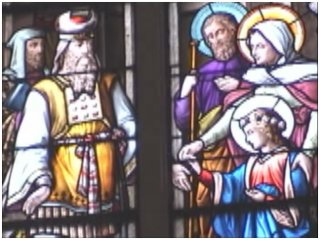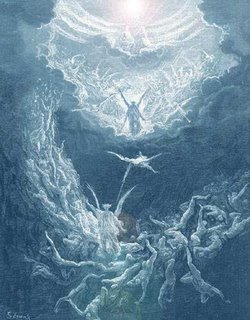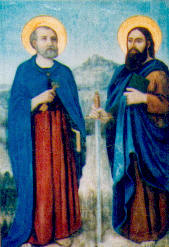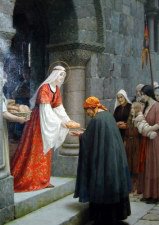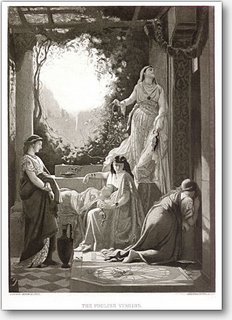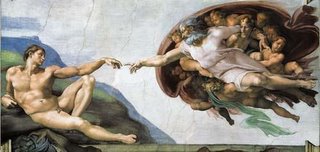 1 November 2005
1 November 2005
Solemnity of All Saints
GOD’S DREAM – JUST A BREATH AWAY
Mt 5:1-12
When I was a little boy, I had a very high ambition. Literally high! Please, do not laugh: I dreamt of becoming an astronaut! But I became a priest instead. God’s ambition for me, I realized later on, was higher.
Nowadays, we seldom hear a little boy declares, “When I grow up, I want to become a priest!” Or a little girl announces, “When I grow up, I want to be a nun!” More seldom do we hear children say, “When I grow up, I want to be a saint.” Almost everybody wants to become anything except a priest, a nun, or a saint. Not that becoming other than a priest, a nun, or a saint is something bad, but that we seem to be too focused on this world that we greatly desire what this world offers: wealth, power, and fame.
We need to pause each day and in silence reflect what God wants for us instead. And what does God want us to become? He wants us to become saints. He desires that we become holy whatever state in life we are in. Today’s Solemnity of All Saints shows us that God’s ambition for us may be too high but it is more within reach than I becoming an astronaut.
We honor today the many holy men and women from all times and places. They are not only the canonized saints. They may also be our own dearly departed whose name may not even reach the Pope’s ears. They do not have statues in our churches or official feastdays in the liturgical calendar, but they are certainly with God and enjoying eternal bliss in heaven. Quite often, we may be praying for their souls, but the truth is that they are praying for our final salvation. We should be praying to them instead after all.
Let me not go too far. Please allow me to share with you my own father who passed away in 1998. He was a poor man who never held a college degree. Despite his educational handicap, he was able to raise four children and gave them good education. Of his four children, one even became a priest.
Like any human being, Dad had his share of human imperfections. I saw him blew his top just like any normal person. He had his stories of conflicts with other people, too. Questions about God were questions he also wrestled with.
When he converted from the Aglipayan Church (the local version of the Anglican Church), it was initially really more for convenience rather than out of a deep-seated faith. Mom would not marry him if he were not a Catholic. Perhaps because it was more of a conversion for convenience, that it took him a long while to own the Catholic faith. He missed many Sunday Masses, would work even on Sundays, had negative comments about priests, and never went to confession. But God patiently waited for Dad when he was ready to take his newfound faith to heart.
God used so many events in Dad’s life to make him realize that God loved him so much and desired for nothing else but the same love from him in return. God courted Dad as it were: first there was the Cursillo, then the Catholic Charismatic Renewal, then the Parish Renewal Experience, then the Marriage Encounter Movement, and lastly, as if a joke on him who used to criticize the clergy, a priest-son. Very slowly, and oftentimes very painfully, too, Dad’s life made a complete turn from his old ways and became a new man in Christ. He started going to Mass regularly, joined us in praying the daily rosary, began to be generous to the church, started to have a positive view on priests, and developed a very deep devotion to the Most Sacred Heart of Jesus.
Ten years before Dad passed away, he had a nearly fatal illness. He was operated on and was unconscious until he opened his eyes after a few days. When he was already able to converse, I ask him about his experience during the days he was in coma. He narrated to me that from a distance he saw Jesus praying for him. He called out to the Lord but the Lord continued praying. Despite what seemed to be the Lord’s inattentiveness to him, Dad still spoke out saying, “Lord, please give me another chance. I just want to see my son become a priest; then you may take me right there and then after he says his first Mass.” Then, slowly, Dad said, the Lord turned His head, smiled at him as He looked at him in the eye. The next thing Dad remembered was opening his eyes inside the intensive care unit of the St. Luke’s Medical Center. Dad survived and lived on for three more years after my ordination to the priesthood. He made his last confession to me – his son and his priest. As I lean on his bed, after hearing his last confession, I was teary eyed and yet managed to say, “Dad, you are a very good man. You are precious to the Lord. We love you but the Lord loves you even more. We want to take good care of you but the Lord can take care of you even better. I know He can and He does. The Lord has always been generous to you. We have seen that for ourselves. You only wanted to see me become a priest, remember? The Lord granted your request even with a bonus: I am now three years old as priest. Be at peace, Dad. We love you very much, but if you have to go now, go with God. I know, He will never forsake you.” Still only after a month did Dad pass away. On the day he left, it was a First Friday, at 3:00 in the afternoon, after praying the rosary with my Mom and while reciting the Chaplet of the Divine Mercy. His last words were “They are here! They are here! Don’t block their way. They are here now!”
Yes, they were there. They were already there. They – the angels and the saints. They – Dad’s own parents, siblings, relatives and friends who had gone ahead of him to eternity. They – the countless men and women who see the face of God forever. They – most importantly, the Lord who promised that whosoever devotes himself to His Most Sacred Heart will receive final consolation and the Blessed Mother who likewise promised to her devotees powerful assistance at the hour of death. They were all there to pick up Dad and bring him home to heaven.
During his Mass at Dad’s wake, Bishop Soc Villegas said in his homily that Dad was surely with God already, for God cannot be outdone in expressing gratitude. When I celebrate Mass, Bishop Soc explained further, I say over the bread, “This is My Body” and over the cup of wine, “This is My Blood”, then the bread becomes the Body of Christ and the wine becomes the Blood of Christ; they do not become my body and blood. But each time I lift the Body and Blood of Christ in the Mass, Dad prays to God and says, “That is my body; that is my blood”, pointing to me, his son, who offers the Body and Blood of Christ to both God and man. And God, said Bishop Soc, cannot but say, “Thank you for giving your son.”
My father is not a canonized saint. And I think he will never be. But I believe that Dad is in heaven, praying not only for me but for all of us. It is for him and for your own dearly departed whose faith is known to God alone but whose heroic love continues to guide you in your own struggles in life that we celebrate today the festival of saints.
Someday they will also come to pick us up, together with Jesus and Mama Mary, to bring us not only beyond the stars where astronauts go but to heaven where the “Blesseds” dwell forever, in that state of unending joy reserved for those who may be wounded here on earth but nonetheless have fought a good fight, there where the impossible dream becomes possible. Our celebration today tells us that a breath away is not far to where they are.
 Feast of St. Andrew, Apostle
Feast of St. Andrew, Apostle







